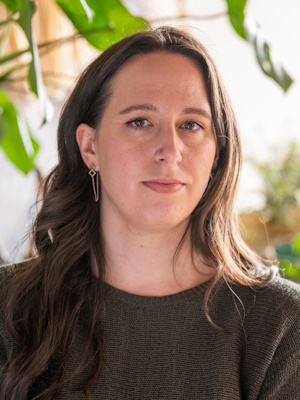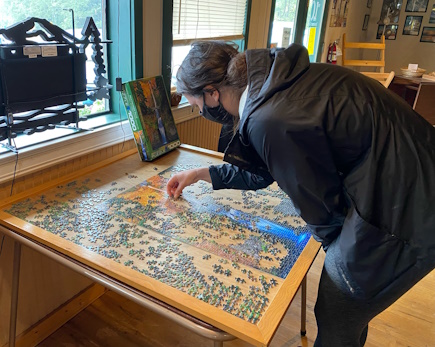Social Work Spotlight: Meet Wayne County Medical Examiner’s Office Social Worker Haley Scott
 Haley Scott wears multiple hats at Wayne State; alumni, doctoral student and one of the inaugural social workers hired by the WSU School of Social Work at the Wayne County Medical Examiner’s Office (WCME). The WCME is responsible for investigating deaths that include but are not limited to accidents, sudden or unexpected deaths, and violent deaths that occur within the county boundaries. Scott will provide bereavement support for families and those close to the deceased, engage in community outreach and partnerships, and provide guidance for MSW student interns who may select this as their field site. As a native Michigander, Scott received her bachelor's in anthropology from Grand Valley State University, followed by her MA in medical anthropology from Wayne State in 2019. Scott then entered the WSU Social Work and Anthropology (SWAN) Program where she also earned her MSW (macro focused) along the way. Scott is currently at the beginning phase of her dissertation and will begin data collection later this summer.
Haley Scott wears multiple hats at Wayne State; alumni, doctoral student and one of the inaugural social workers hired by the WSU School of Social Work at the Wayne County Medical Examiner’s Office (WCME). The WCME is responsible for investigating deaths that include but are not limited to accidents, sudden or unexpected deaths, and violent deaths that occur within the county boundaries. Scott will provide bereavement support for families and those close to the deceased, engage in community outreach and partnerships, and provide guidance for MSW student interns who may select this as their field site. As a native Michigander, Scott received her bachelor's in anthropology from Grand Valley State University, followed by her MA in medical anthropology from Wayne State in 2019. Scott then entered the WSU Social Work and Anthropology (SWAN) Program where she also earned her MSW (macro focused) along the way. Scott is currently at the beginning phase of her dissertation and will begin data collection later this summer.
Why did you choose to work at WSU?
I have been a student at Wayne State since 2016 where I have found overwhelming support in my educational and professional journey. I want to return that same support that I received to the community and to future MSW students/interns. When I first heard about the collaboration between the SSW and the Wayne County MEO, I knew I wanted to be a part of it. I care deeply about the Detroit community, in which the medical examiner’s office (MEO) is embedded and want to provide services and resources that can help those who are experiencing loss.
What is your area of research focus?
What’s really neat is this role at the MEO and my PhD studies overlap! My area of interest is in death, the postmortem body, stigmatization, care, and ethics- all of which have been influenced by my time working as an autopsy technician in several MEOs across Michigan (including Wayne County). My dissertation research utilizes ethnographic inquiry (a qualitative research method of long-term field-site engagement) to examine the social and cultural construction of the body within an MEO setting to give insight into both theoretical concepts of the postmortem body and in practice for social workers and other professionals in the field.
What is your favorite class to teach?
I really enjoyed teaching in the anthropology department (ANT 2200: Lost Cities and Ancient Civilizations) where we traveled the world through the early development of agriculture, cities, and the growth of civilizations. The hardest part was deciding which cities and civilizations to cover in 15 weeks!
How do you empower social change in your community?
Through my work in both roles as a social worker and a graduate student, I want to really highlight the importance of social justice issues after death. Not only am I providing services to the community, but especially to the deceased as social and structural inequities continue after death. Addressing and navigating financial, environmental, and cultural barriers to grief and disposition are crucial to enact social change.
Do you have any advice for students or alums?
Be curious! Explore all the facets of social justice that you might be slightly interested in. In my experience I have found that the connections between research topics or clinical interests will help guide you to finding gaps in knowledge, new intersections to explore, and a wide range of methods and theories to investigate. This also extends into networking (virtually or in-person) and talking with fellow social workers or scholars in the humanities about their experiences, challenges, upcoming projects, or opportunities for collaboration.
 What is a fun fact others may not know about you?
What is a fun fact others may not know about you?
One of my favorite hobbies is doing jigsaw puzzles. I have an ever-growing collection and even had a custom stamp made to put on each one in case I lend it out!
View more Social Work Warrior profiles.